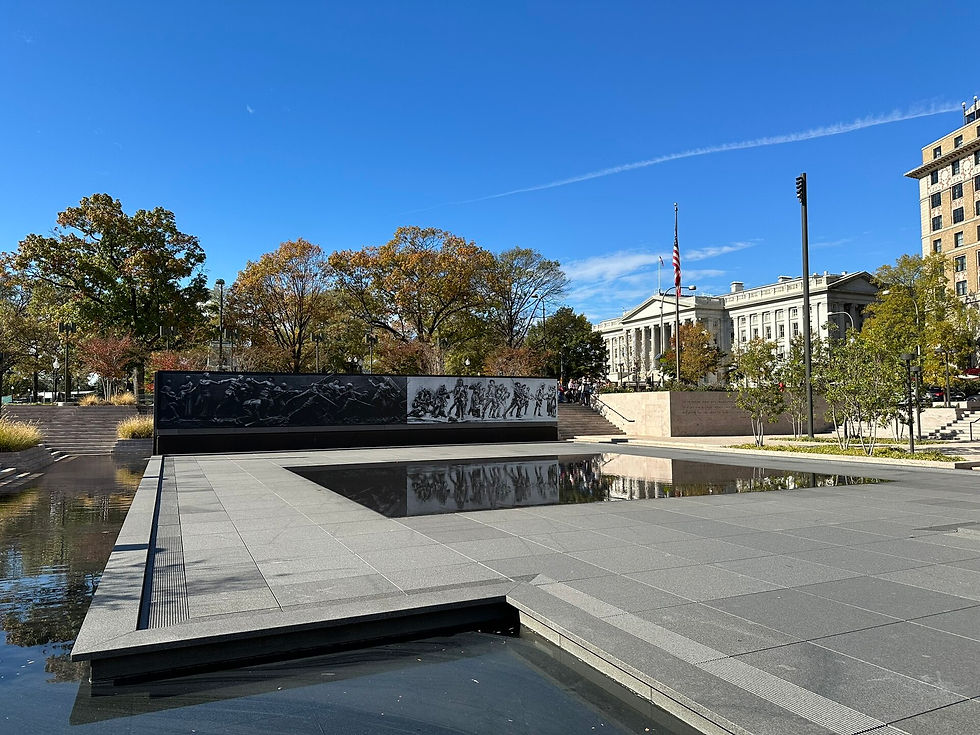Armistice Day
- Joe

- Nov 11, 2025
- 4 min read
Today is Veteran's Day. We celebrate our veterans of the armed forces and thank them for their service. It's intended to be a day for living veterans, as opposed to Memorial Day where we remember those that have passed on. A day for those who served and are still with us. So if you know any veterans, reach out and check in.
Naturally I want to look back at why we use November 11th for Veteran's Day. It goes back to World War 1, as we now call it. At the time this conflict was easily the largest war in human history, the War to End All Wars, the Great War. By now completely overshadowed by World War 2, still the defining event of our world 80 years later, and is almost a forgotten war. Well, it is here in America.
When my wife and I traveled to the U.K., in the before times, I was consistently struck by how many monuments there were to WWI vets. They were everywhere, in every city. It was an absolutely devastating event that we, in our comfort here in the U.S., will never entirely understand. An entire generation of European men was lost to the trenches, and most of their best. I don't think it's all that controversial to date the ultimate decline of European global hegemony to that meat-grinder of a war.
The conflict started in 1914 with the assassination of Archduke Ferdinand, heir of the Austrian Habsburgs. Due to a series of alliances, set up in theory to try and prevent large-scale war, Austria's mobilization against Serbia (the assassin was Serbian) led directly to Russia declaring war on Austria, Germany declaring war on Russia and France, and the United Kingdom declaring war on Germany. The 'Triple Alliance' or 'Central Powers' in WWI were the massive German Empire, Austria-Hungary and the Ottoman Empire. The 'Triple Entente' were the United Kingdom, France and Russia. Considering this was also at the height of European imperialism, so these countries all had overseas territories or designs on them, this would truly be a 'world war.'
Though armies moved quickly at first, they got bogged down significantly in short order on the western front. This was the now infamous trench warfare, where huge armies would slaughter one another going back and forth over tiny sections of land, where the battles of Verdun and the Somme were fought, and where chemical warfare, like the use of chlorine gas, was used. But neither side, in like four years, could actually break through and end the stalemate.
In the east the lines moved more, there's a lot of land that way, but the fighting was just as brutal. This is the Russians we're talking about. Events were so bad for the Russian army and for the people starving at home that the 300 year rule of the Romanovs, Tsar Nicholas et al. ended in early 1917 with the beginning of the Russian Revolution. The Tsar abdicated and Vladimir Lenin was soon shipped back to Russia, some nasty meddling executed by the Germans. In 1918 Russia officially withdrew from the war and the Romanovs (including Anastasia) were all murdered.
Back in the west, 1917 saw the entry of the United States into the war. American troops didn't really arrive en masse until late 1918, though shockingly we still had 100+k deaths in only a few months. Still, while progress was being made and the Entente was slowly, painfully gaining the upper hand, outright victory was not imminent through army offensives. But, exhausted from the killing, negotiations began between the remaining powers, at this point the U.S., the U.K., France and Germany. How this actually looked was the German decision makers crossing the lines and being escorted to the private train car of the French Supreme Commander, where they were given a list of demands and 72 hours to sign. Eventually, with some very minor haggling, the Germans did agree. Fighting was to stop 'at the 11th hour of the 11th day of the 11th month.'
11am (Paris time) on November 11, 1918
The agreed cessation of fighting, the Armistice, required much from the Germans and little from the rest. Germany had to withdraw from France, was to be partially occupied, give up military supplies, let go its prisoners of war. The blockade of Germany remained. There would be reparations. Though not formally a surrender, it was defeat. It's too bad Woodrow Wilson so butchered the Treaty of Versailles, the actual treaty signed in 1919. It's a great historical What If?, to try and guess what would've happened had the punishment for Germany not been so harsh. More on him another time, perhaps.
Armistice Day is celebrated to this day, more than 100 years later. It's a national holiday in France. It's called Remembrance Day in the U.K. and the Commonwealth. In the United States, the day was altered to Veteran's Day in 1954. But I still think it's valuable to know where it came from.
Happy Armistice (and Veteran's) Day everyone.







Btw, both versions of All Quiet on the Western Front (1930, 2022) are very good.